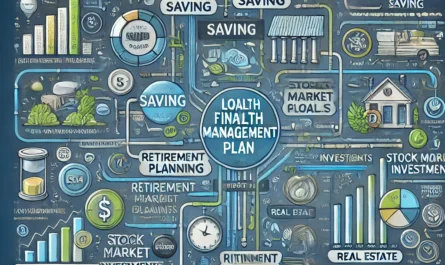Building generational wealth involves more than simply accumulating assets—it’s about creating sustainable financial stability that can be passed down from one generation to the next. Generational wealth, or legacy wealth, ensures that your children, grandchildren, and beyond can benefit from the financial foundation you’ve laid. In this article, we’ll explore the key principles, strategies, and tools necessary for building generational wealth for your family.
What is Generational Wealth?
Generational wealth refers to assets—money, property, investments, or businesses—passed down from one generation to the next. This concept goes beyond immediate financial security; it’s about creating a legacy that provides financial comfort and opportunity for future family members. Generational wealth is often viewed as a significant factor in closing the wealth gap, allowing families to maintain financial stability across multiple lifetimes.
Wealth transfer can take many forms, from direct inheritance to gifts, trusts, or business ownership, but its essence lies in the long-term benefits it provides. Unlike financial windfalls or temporary gains, generational wealth requires thoughtful planning, disciplined investing, and a keen understanding of both the present and future financial landscape.
Why Generational Wealth is Important
The importance of generational wealth can’t be overstated, as it serves as a financial cushion that offers future generations the freedom to pursue education, careers, and personal goals without the immediate pressure of financial insecurity. Families with generational wealth can afford to take risks, start businesses, or invest in assets that appreciate over time. This type of financial stability fosters an environment where future generations can make choices that prioritize long-term success over short-term survival.
Moreover, generational wealth supports education, healthcare, and homeownership—key factors in economic mobility. It provides future family members with opportunities that can accelerate upward social and economic movement, laying the groundwork for sustained prosperity.
Understanding the Wealth Gap
One of the major hurdles to building generational wealth is the existing wealth gap. The divide between wealthy families and those with less financial means has only widened in recent decades, due to systemic barriers, unequal access to resources, and differences in financial education. Wealthier families are often able to leverage their resources to build further wealth, while those without a financial cushion find it difficult to gain traction.
To combat this, understanding why some families struggle to pass wealth down is critical. Key factors include a lack of financial literacy, poor investment strategies, debt, and the absence of long-term planning. By addressing these issues, families can begin to close the wealth gap and ensure their financial security for future generations.
The Basics of Wealth Accumulation
At its core, building wealth starts with the basics: saving, investing, and reducing debt. The earlier a family starts, the more opportunities they have to take advantage of compound growth. Establishing savings accounts, creating emergency funds, and investing in stocks, bonds, or real estate are crucial steps toward wealth accumulation.
Debt management is equally essential. High-interest debt, like credit cards or personal loans, can drain your resources, making it difficult to accumulate wealth. Focus on paying off or reducing debt while simultaneously increasing savings to strike a balance.
Financial Literacy for Building Wealth
Financial literacy is the foundation upon which generational wealth is built. Teaching family members about money management, budgeting, and investing equips them with the tools necessary for financial success. Financial education should start early and cover essential topics like the importance of saving, how compound interest works, and the difference between good debt (like mortgages) and bad debt (like high-interest loans).
A financially literate family is more likely to avoid common pitfalls, such as overspending, accumulating debt, or falling victim to poor investment schemes. By emphasizing the power of saving, investing, and delayed gratification, parents can instill a legacy of financial responsibility.
Investing in the Stock Market
Investing in the stock market remains one of the most effective ways to build generational wealth. Stocks offer long-term growth potential and, when approached with patience and sound strategy, can yield substantial returns over time. The key is to adopt a long-term view—investing in quality companies or index funds that can grow and compound wealth over decades.
For families new to the stock market, it’s important to seek guidance from financial advisors or leverage low-cost investing platforms. Diversification—spreading investments across various sectors—is crucial to mitigating risk and ensuring that your portfolio can weather economic downturns while continuing to grow.
Real Estate Investments
Real estate has long been a reliable method for building and transferring generational wealth. Whether it’s buying a family home, investing in rental properties, or purchasing commercial real estate, property ownership provides tangible assets that appreciate over time. Real estate can generate passive income through rentals while also serving as a long-term investment that appreciates in value.
For families, passing down real estate can create a lasting legacy. It provides future generations with a place to live, a potential source of income, and an appreciating asset. Moreover, tax advantages like mortgage interest deductions and capital gains tax exemptions on primary residences make real estate an attractive wealth-building tool.
Entrepreneurship as a Wealth Tool
Starting and growing a family business is another powerful way to build generational wealth. Entrepreneurship allows families to create something that not only generates income but can also be passed down to future generations. A well-established family business can provide long-term financial security and job opportunities for family members.
Entrepreneurship requires dedication, resilience, and smart planning, but the rewards can be immense. By fostering a culture of innovation and adaptability within the family, a business can grow and evolve with changing market conditions, ensuring its longevity.
Diversifying Your Investment Portfolio
Diversification is a cornerstone of smart investing. By spreading investments across different asset classes—stocks, bonds, real estate, commodities, and even alternative investments like cryptocurrency—families can minimize risk while maximizing returns. A diverse portfolio ensures that if one asset underperforms, others can balance the loss, providing greater financial stability.
Families should regularly reassess their portfolios to ensure they are aligned with long-term goals and are sufficiently diversified. A balanced portfolio allows wealth to grow steadily, regardless of short-term market volatility.
Saving for College and Education
Investing in education is one of the best ways to ensure long-term financial success for future generations. Education opens doors to higher-paying jobs, entrepreneurial opportunities, and greater economic mobility. Setting aside funds for education, whether through 529 college savings plans or other investment vehicles, ensures that your children and grandchildren can pursue higher education without being burdened by student debt.
Education funding is a critical element of generational wealth, as it provides the skills and knowledge necessary to navigate an increasingly complex financial landscape.
Tax Strategies for Wealth Preservation
Minimizing taxes is crucial for building and preserving generational wealth. Families should utilize tax-efficient investment strategies like retirement accounts, tax-deferred investments, and charitable giving to reduce their overall tax burden. Trusts and estate planning tools can also help preserve wealth by ensuring that assets are passed down efficiently, with minimal taxes or legal complications.
Working with a tax professional can provide families with personalized strategies to reduce their tax liabilities while maximizing their wealth growth.
Retirement Planning for Generations
Retirement planning is not just about securing financial stability for individuals; it’s about creating a sustainable wealth transfer strategy for future generations. Contributing to retirement accounts like 401(k)s, IRAs, and Roth IRAs ensures that wealth can grow tax-free or tax-deferred, providing a significant financial cushion for both current and future family members.
By making smart decisions around retirement planning, families can build wealth that lasts well beyond their lifetimes, ensuring a secure financial future for generations.
The Power of Compound Interest
Compound interest is a powerful tool in wealth building, allowing investments to grow exponentially over time. The earlier a family begins investing, the more time compound interest has to work its magic. Compound interest allows your money to earn returns on both the original principal and the interest accrued, accelerating the growth of wealth.
By reinvesting dividends, interest, and profits, families can significantly boost their wealth over the long term, making compound interest a critical element of any generational wealth-building strategy.
Creating Multiple Streams of Income
Relying on a single source of income can be risky. By creating multiple streams of income—through investments, businesses, rental properties, and side hustles—families can diversify their financial inflows and reduce their dependence on any one source. Passive income sources, like dividends, royalties, and rental income, are especially valuable for long-term wealth creation.
Multiple income streams provide financial security and can serve as a buffer against economic downturns, ensuring that your family’s wealth continues to grow regardless of external conditions.
Life Insurance as a Wealth Transfer Tool
Life insurance is an often-overlooked tool for building generational wealth. By purchasing life insurance policies, families can ensure that their loved ones are financially supported in the event of death. Life insurance provides a direct transfer of wealth to beneficiaries, free from taxes and probate, making it a powerful tool for passing down wealth.
Policies like whole life or universal life insurance can also build cash value over time, which can be used during your lifetime to fund investments or emergencies.
Trusts and Estate Planning
Establishing trusts and engaging in thorough estate planning are critical steps in ensuring that your wealth is passed down according to your wishes. Trusts offer a legal framework for transferring assets to future generations while minimizing taxes, protecting assets from creditors, and ensuring privacy.
Working with an estate planning attorney ensures that your assets are distributed fairly and efficiently, providing a clear path for your heirs to follow when managing the family’s wealth.
Philanthropy and Legacy Building
Philanthropy is an essential part of legacy building. By giving back to your community or supporting causes that align with your family’s values, you create a legacy that goes beyond financial wealth. Charitable giving can also offer tax advantages, allowing families to reduce their tax burdens while supporting meaningful causes.
Philanthropy fosters a sense of purpose and responsibility in future generations, encouraging them to think beyond personal wealth accumulation and consider the broader impact of their financial success.
The Role of Inheritance
Inheritance planning is a sensitive but necessary part of building generational wealth. Families should carefully consider how their assets will be divided among heirs to avoid disputes and ensure a smooth transition of wealth. Clear communication and legal documentation are essential in this process.
Inheritance isn’t just about dividing money—it’s about passing down values, responsibilities, and the knowledge necessary to maintain and grow the family’s wealth.
Managing Risk in Wealth Building
Every investment carries some level of risk, but successful wealth-building requires careful risk management. Families should avoid high-risk investments that could jeopardize their long-term financial security. Instead, focus on steady, reliable growth through diversified investments.
Insurance products, such as life and property insurance, are also important in protecting against financial losses due to unforeseen circumstances.
Teaching Future Generations
To ensure the continuation of generational wealth, it is critical to educate younger family members on financial responsibility and wealth-building strategies. By involving children in family financial discussions, teaching them about saving and investing, and modeling good financial behavior, parents can set the stage for future success.
Children who grow up with a solid understanding of money management are more likely to make smart financial decisions as adults, ensuring that wealth is preserved and grown across generations.
Common Pitfalls in Wealth Building
Building generational wealth is not without its challenges. Common mistakes include overspending, failing to plan for taxes, and neglecting to update estate plans. Families must also be cautious about relying too heavily on one investment or income source.
By being aware of these pitfalls and taking proactive steps to avoid them, families can stay on track toward their long-term wealth goals.
The Importance of Financial Advisors
A trusted financial advisor can provide invaluable guidance on building, preserving, and transferring wealth. Advisors can help families navigate complex financial decisions, offer personalized investment strategies, and ensure that their wealth-building efforts align with their long-term goals.
Partnering with a financial advisor ensures that your family’s wealth-building strategy is both effective and sustainable.
Passing Down Family Values with Wealth
Wealth alone is not enough to secure the future success of your family. Passing down values—such as responsibility, discipline, and philanthropy—ensures that future generations will use their wealth wisely and continue to build on the foundation you’ve established.
By fostering a culture of integrity and responsibility, families can ensure that their legacy lasts beyond money.
Documenting a Family Financial Plan
Creating a documented financial plan that outlines your family’s wealth-building goals, investment strategies, and asset distribution plans is essential for keeping everyone on the same page. A family financial plan provides clarity, ensures that everyone understands their role, and helps maintain focus on long-term goals.
Review and update your family’s financial plan regularly to account for changes in circumstances and ensure that your wealth-building strategy stays relevant.
The Long-Term Perspective
Building generational wealth requires patience, discipline, and a long-term mindset. Families must be willing to make sacrifices in the short term for the sake of long-term financial security. By focusing on sustainable wealth-building strategies—such as investing, saving, and educating future generations—families can create a financial legacy that endures for generations to come.
You Can Also Read : How to Create a Long-Term Wealth Management Plan
Building generational wealth is a journey that requires strategic planning, disciplined investing, and a commitment to educating future generations. By focusing on long-term growth, diversification, and financial literacy, families can create a lasting legacy that provides financial security for generations to come. Whether through real estate, stocks, businesses, or trust funds, the key is to start early and remain consistent in your wealth-building efforts.



